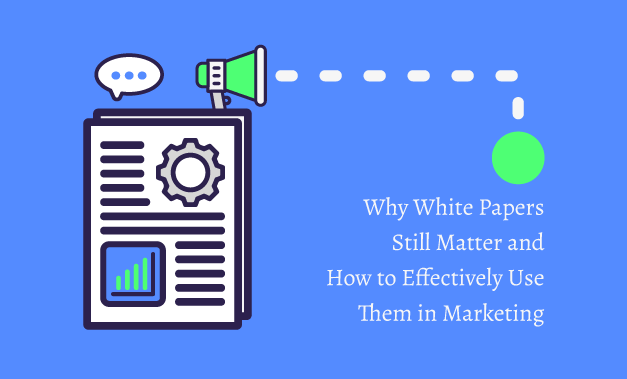White Papers play a valuable role in content marketing, yet many companies don’t understand how to use them effectively. They may not even know what White Papers are! This post clarifies the purpose of White Papers and explains how you can incorporate them into your marketing strategy.
The Purpose of White Papers
White Papers are informative, well-researched reports that analyze a certain topic and its associated challenges and solutions. They include facts, arguments, and in-depth analysis supported by research and information from credible sources and experts. The Churchill White Paper—a 1922 British statement of policy that intended to explain the Balfour Declaration and reassure Palestinians—is considered one of the earliest examples of a White Paper.
Today, White Papers are not just government-issued documents—they’re also important pieces of marketing content that concern a company’s products, services, and/or industry. Businesses in consulting, finance, and B2B sectors use White Papers to
- Present an organization’s philosophy on a certain topic
- Persuade readers that the product or service is superior to that of competitors
- Introduce research findings within the industry
Why White Papers Matter
Beyond being compelling marketing tools, here are several other reasons why White Papers are so important:
- White Papers suggest or enhance expertise. The researched, analytical content of a White Paper positions your company as a thought leader and expert in your given field.
- White Papers build trust. Authoritative, persuasive White Papers that are bolstered with credible research can suggest to your audience that you’re reliable and knowledgeable about the topic. In other words, if customers search for a solution to understand their problem and your company provides them with an answer via a high-quality White Paper, you’re likely to be considered trustworthy.
- White Papers increase sales. Customers want to give business to companies that they trust. White Papers establish trust in your company, which translates into sales.
- White Papers generate more value and more leads. To further speak to the trust a White Paper fosters, customers are more likely to exchange personal information for gated content if they trust the company.
- White Papers have staying power. White Papers are unique pieces of marketing content because they’re not overtly selling anything—they’re educating readers about relevant, timely topics and issues. Well-researched White Papers that include statistically significant data are far from ephemeral and instead provoke innovative thinking.
Marketing with White Papers
Content marketing strategies effectively employ the use of White Papers in many ways. Most commonly, White Papers are used at the top of the sales funnel. Examples include email and search engine marketing campaigns, native ads, and more. These White Paper tactics introduce brands, directly pitch products, and engage prospective clients. However, White Papers can be used further down the funnel as well. This section identifies a few ideas, but there’s no limit to the number of creative ways you can use this marketing workhorse.
Website
Posting White Papers on your website is a great way to both distribute your content and generate more website traffic. However, you’ve put a lot of time and effort into creating the White Paper, so consider making it gated content. Create a landing page for the White Paper on your website that’ll serve as an introduction to the document and collect prospects’ contact information.
Sales
White Papers can play a significant role in the sales process. For example, you make White Papers available on your website in exchange for readers’ contact info. Then, your sales team can use that contact info to build a mailing list of prospects. Your sales team can also send the White Papers directly to prospects; doing so strengthens the sales pitch and complements other marketing literature.
Social Media
Using social media channels to distribute your White Papers is a sound marketing strategy. Craft a LinkedIn post featuring the link to your White Paper. Consider investing in paid techniques, such as Facebook ads, Google ads, and sponsored tweets and videos about your White Paper. You may also wish to post custom infographics and compelling quotes from the White Paper to intrigue customers to read the full-length document.
Influencers/Brand Ambassadors
Brand ambassadors and influencers that have a similar audience to that of your company can also be instrumental in marketing your White Papers. Invite them to discuss the topic of your White Papers in a way that engages community members and increases traffic to your website. Also, encourage them to publish or promote your White Papers via their social media accounts or content creation videos.
Public Relations
It’s a great idea to have PR professionals and journalists write articles on the topic of your White Paper—they can cite your White Paper and provide a link to the full-length report. You may also want to rework segments of your White Paper into articles for newsletters, journals, and magazines in the same field.
Conclusion
White Papers add tremendous value to marketing toolkits, but they can be challenging to create. SuccessKit can handle it all for you—right down to the research, interviews, writing, and design. Set up a meeting with us and learn how we can help you with your White Paper needs.




























































